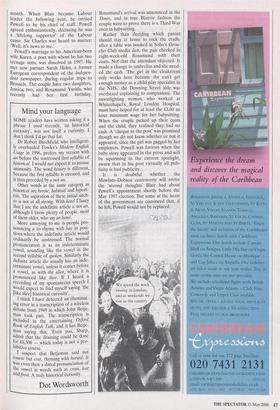Mind your language
SOME readers have written asking if a phrase I used recently, 'an historical curiosity', was not itself a curiosity. I don't think I'd go that far.
Dr Robert Burchfield, who intelligent- ly overhauled Fowler's Modem English Usage in 1996, prefers my version with an before the unstressed first syllable of historical. I would not expect it to arouse animosity. The word history is different, because the first syllable is stressed, and is thus preceded by a not an. Other words in the same category as historical are heroic, habitual and hypoth- esis. The aspiration of these initial aitch- es is not at all strong. With hotel I fancy that I use the indefinite article a not an, although I know plenty of people, most of them older, who say an hotel.
More annoying to me is people pro- nouncing a to rhyme with hay in posi- tions where the indefinite article would ordinarily be unstressed. The normal pronunciation is as an indeterminate vowel, sounding like the vowel in the second syllable of spoken. Similarly the definite article the usually has an inde- terminate vowel, unless it comes before a vowel, as with the idiot, where it is pronounced like thee. If I heard a recording of my spontaneous speech I would expect to find myself saying 'the [like thee] historical curiosity'. I think I have detected an illuminat- ing error in a transcription of a wireless debate from 1949 in which John Betje- man took part. The transcription is included in the entertaining Oxford Book of English Talk, and it has Betje- man saying this: 'Even you, Sharp, admit that the draining could be done for £8,500 — which today is not a pro- hibitive course.' I suspect that Betjeman said not course but cost, rhyming with horsed. It was even then a dated pronunciation of the vowel in words such as cross, lost and frost. A truly historical curiosity.
Dot Wordsworth


























































 Previous page
Previous page